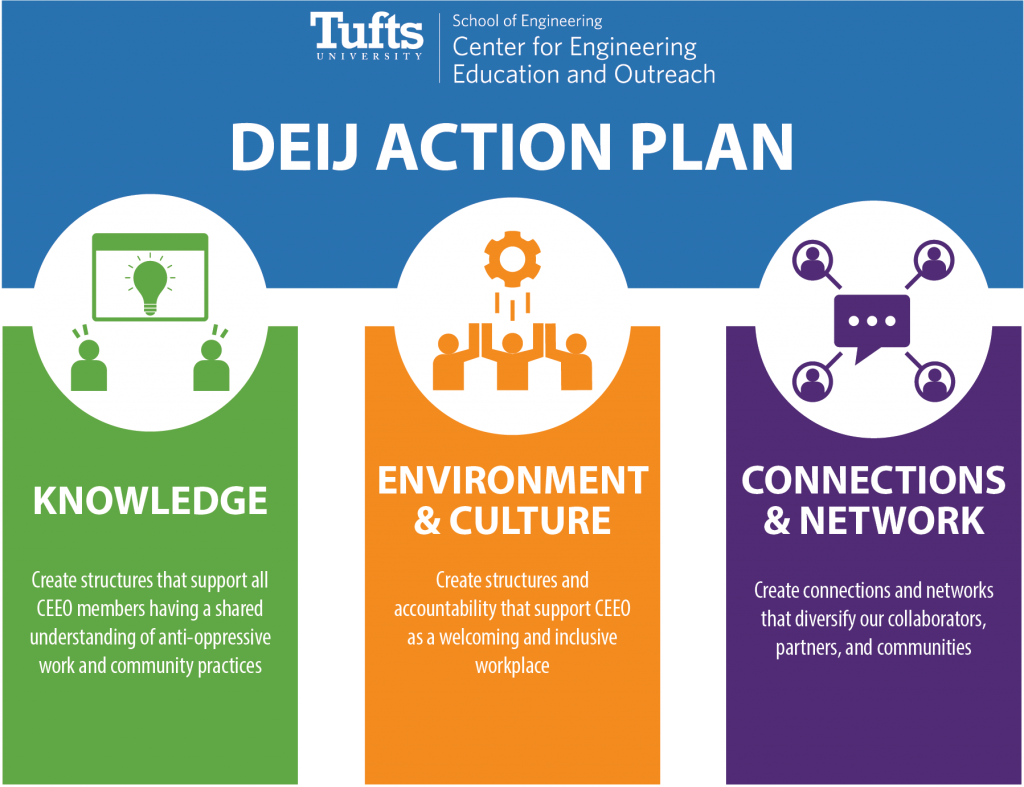Our commitment to Diversity, Equity, Inclusion, and Justice (DEIJ) is rooted in our vision of creating the next generation of problem solvers who can create ethical and equitable solutions to global challenges.
Tufts Center for Engineering Education and Outreach (CEEO) is a collection of researchers, educators, learners, and community members that values creating access, opportunity, and advancement through engineering education. Tufts CEEO has prioritized becoming an organization that is welcoming, equitable, and inclusive. We acknowledge this is an ever-changing quest and that engineering and education has been deeply shaped by oppressive systems such as racism, sexism, ableism, and classism. To this end, Tufts CEEO works toward:
- Building and supporting a CEEO workforce that is equitable and diverse in thought, experience, and representation.
- Creating a community at CEEO that is transparent, collaborative, reflective, respectful, and inclusive.
- Creating engineering education scholarship, teaching, and technology built on equity and inclusion by acknowledging existing power structures and working to counter dominant narratives around engineering (who gets to be an engineer, is included in engineering/can be considered an engineer)
- Identifying barriers faced by marginalized populations and working to address these barriers by actively seeking out their voices and building upon communities’ existing assets in our research, outreach, teaching, and technology design and development.
- Recognizing that our work needs to be done in partnership with diverse community organizations and experts, and working to support and build that network.
To support this vision, our DEIJ Action Plan has been designed to enable Tufts CEEO members to collaboratively work towards building knowledge about anti-oppressive work in our community, creating a welcoming and inclusive working environment, and diversifying our network of collaborators and partners.

Timeline


Strategy 1: Knowledge:
Create structures that support all CEEO members having a shared understanding of anti-oppressive work and community practices
 Initiative 1-1 – DEIJ Training: Provide DEIJ educational opportunities throughout the year and provide support for CEEO members to pursue their own DEIJ education. These opportunities will promote the continual development of DEIJ values and practices and will help CEEO members align their work to these values. Read more.
Initiative 1-1 – DEIJ Training: Provide DEIJ educational opportunities throughout the year and provide support for CEEO members to pursue their own DEIJ education. These opportunities will promote the continual development of DEIJ values and practices and will help CEEO members align their work to these values. Read more.
 Initiative 1-2 – DEIJ and Research: Create documents and processes to support CEEO members in incorporating DEIJ practices in research operations. Read more.
Initiative 1-2 – DEIJ and Research: Create documents and processes to support CEEO members in incorporating DEIJ practices in research operations. Read more.
 Initiative 1-3 DEIJ and Outreach: Create DEIJ Outreach Practices documents and processes to support CEEO members in using DEIJ practices in outreach. Read more.
Initiative 1-3 DEIJ and Outreach: Create DEIJ Outreach Practices documents and processes to support CEEO members in using DEIJ practices in outreach. Read more.
 Initiative 1-4 – Supporting Inclusive Management: CEEO will support those in supervisor roles to be equitable, ethical, and inclusive managers and leaders. This will be enacted through recommended resources, training, and tools that address transparency, communication, conflict management, as well as bidirectional feedback and accountability structures. Focus will include proactive measures as well as incorporating conflict resolution strategies. Read more.
Initiative 1-4 – Supporting Inclusive Management: CEEO will support those in supervisor roles to be equitable, ethical, and inclusive managers and leaders. This will be enacted through recommended resources, training, and tools that address transparency, communication, conflict management, as well as bidirectional feedback and accountability structures. Focus will include proactive measures as well as incorporating conflict resolution strategies. Read more.

Strategy 2: CEEO Environment/Culture:
Create structures and accountability that support CEEO as a welcoming and inclusive workplace
 Initiative 2-1 – Onboarding: Define CEEO onboarding requirements for different CEEO member groups (e.g. faculty, staff, students) and a timeline for completion for CEEO members. This initiative will identify the different CEEO member groups and outline what onboarding requirements are necessary for each group and the timeline for completion of onboarding requirements. Read more.
Initiative 2-1 – Onboarding: Define CEEO onboarding requirements for different CEEO member groups (e.g. faculty, staff, students) and a timeline for completion for CEEO members. This initiative will identify the different CEEO member groups and outline what onboarding requirements are necessary for each group and the timeline for completion of onboarding requirements. Read more.
 Initiative 2-2 – DEIJ Committee: Establish CEEO DEIJ Committee composed of CEEO members that will meet regularly. Read More.
Initiative 2-2 – DEIJ Committee: Establish CEEO DEIJ Committee composed of CEEO members that will meet regularly. Read More.
 Initiative 2-3 – Inclusive Community: Develop CEEO-wide community-building activities and schedule, including a series of events and activities for the internal CEEO community that are designed to counteract “competitive” culture and build an inclusive community. Read more.
Initiative 2-3 – Inclusive Community: Develop CEEO-wide community-building activities and schedule, including a series of events and activities for the internal CEEO community that are designed to counteract “competitive” culture and build an inclusive community. Read more.
 Initiative 2-4 – Reporting Systems: Create conflict resolution, bystander intervention, and reporting systems and processes that includes addressing sexism issues in addition to anti-racism. Read more.
Initiative 2-4 – Reporting Systems: Create conflict resolution, bystander intervention, and reporting systems and processes that includes addressing sexism issues in addition to anti-racism. Read more.
 Initiative 2-5: Make internal CEEO resources available to faculty, staff, and students, including funds for personal training, training to support other goals, and bringing in speakers. This also includes financial support for housing and transportation for summer interns, and a liveable wage payscale.
Initiative 2-5: Make internal CEEO resources available to faculty, staff, and students, including funds for personal training, training to support other goals, and bringing in speakers. This also includes financial support for housing and transportation for summer interns, and a liveable wage payscale.
 Initiative 2-6: Define and implement transparent reporting for our outreach, financial and research activity.
Initiative 2-6: Define and implement transparent reporting for our outreach, financial and research activity.

Strategy 3: Connections/Network:
Create connections and networks that diversify our collaborators, partners, and communities
 Initiative 3-1: Create guidelines for our public facing information (e.g web, marketing, communication with new collaborators) that convey our values and culture.
Initiative 3-1: Create guidelines for our public facing information (e.g web, marketing, communication with new collaborators) that convey our values and culture.
 Initiative 3-2: Expand CEEO’s research network by developing deeper relationships and communication with BIPOC scholars, organizations, external evaluators, and other stakeholders that are part of the engineering education ecosystem.
Initiative 3-2: Expand CEEO’s research network by developing deeper relationships and communication with BIPOC scholars, organizations, external evaluators, and other stakeholders that are part of the engineering education ecosystem.
 Initiative 3-3: Create and sustain community equitable partnerships (local and global) with other organizations, ensuring that CEEO is providing resources/outreach and that diverse organizations can participate in CEEO research, consulting, and testing.
Initiative 3-3: Create and sustain community equitable partnerships (local and global) with other organizations, ensuring that CEEO is providing resources/outreach and that diverse organizations can participate in CEEO research, consulting, and testing.
 Initiative 3-4: Support our network of alumni to connect with current Tufts (or CEEO) students.
Initiative 3-4: Support our network of alumni to connect with current Tufts (or CEEO) students.
